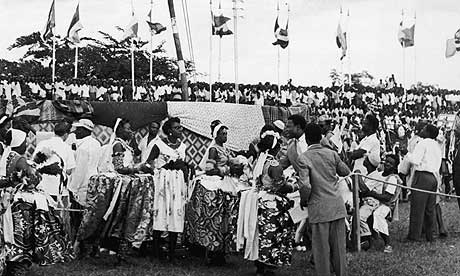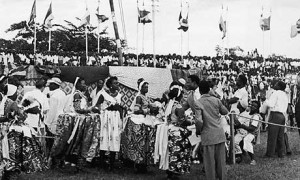By Nehi Igbinijesu.

At the beginning of the 1950s, agitations had begun to fill the ears of London. England like almost every other European colonialist had suffered the harsh economic impact of two world wars. It was fitting at this time for Europe to shed responsibility for its colonies. West Africa was no different. Ghana’s independence had left a sour taste in the mouths of the British and there was need for caution. The fifties had ushered constitutional conferences all over Africa. And like other nationalists across Africa, Kwame Nkrumah and his Convention Peoples’ Party had gained enormous ground culminating in the 1953 ‘Motion of Destiny’ speech that ultimately led to Ghana’s independence in 1957. Ghana had practically opened the door at a time when the British were ready to cede independence to its colonies in Africa. However, Ghana’s choice of leadership had worried the British. In 1954, the framework for an independent Nigeria had been tabled for the first time. And as the process progressed, more British involvement as to who led Nigeria at independence became a priority for them. They obviously did not want another vociferous Nkrumah leading Nigeria.
Undoubtedly, Ghana’s independence precipitated our Independence Constitutional Conferences in Lancaster and Lagos in 1957 and 1958 respectively. And somewhat disparaged by the fact that those conferences were silent on the forging of a vision for the Nigerian people, the Independence Constitution gave credence to economically viable regions; a truly federal country where men of different creeds and languages could stand shoulder to shoulder, as partners to build a country. So did our founding fathers dream.
But like every uncultivated field, the weeds of tribalism and nepotism sprung through the fabric of our society. Nigeria’s founding fathers had failed because there was no vision; and so failed the first republic, second and third. Its essence of leadership had been aloof before the country was even born. And it saddens me that we have not learned the lessons of our heroes past. One may easily conclude that we achieved independence because our Ghanaian sister landed hers and not because we understood the purpose of our independence.
But again, there have been resounding moments in our history when it felt sublime to be Nigerian. Our rich culture, our international acclaims in literature, football, peace-keeping and a plethora of many good things Nigerians all over the world have amassed and achieved. These feats in the annals of history encapsulate a purpose to our existence as a country. Now, we must find our own purpose in the world to be truly free; for true freedom is found in the ability to help others live free.
Our Independence can only find its meaning when we truly understand our purpose as a country. America, we know stands for liberty. England, we know stands for excellence. China, we can say stands for productivity. But what does Nigeria stand for?
Our independence will begin to mean something when we find purpose; when our leaders rise up with vision. Nigeria is the resource-richest country on earth but vision must impel us; then nothing can stop us.
In the words of Madiba Mandela: “For to be free is not merely to cast off one’s chains, but to live in a way that respects and enhances the freedom of others.”


